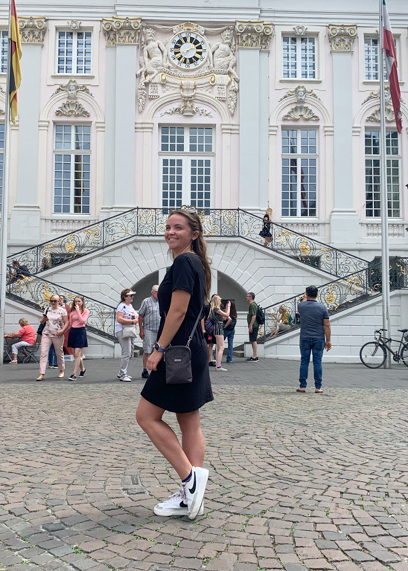Madeleine Russell is a senior majoring in microbiology from Marshall, Michigan, and a College of Natural Science Dean’s Research Scholar.
“Ich hätte gerne einen kaffee, bitte.” I’d like a coffee, please. A simple phrase, but one that was essential for me this past summer when working as a German Academic Exchange Service Research Internships in Science and Engineering fellow in Düsseldorf, Germany.
Like most of my college choices, I applied to the study abroad program on a whim in November of my junior year, never expecting to win the international fellowship, which gave me a generous living and travel stipend. When I found out I had been accepted and awarded a position at the prestigious German Diabetes Center for the summer of 2022, I was ecstatic.
However, I quickly remembered that I had taken Spanish in high school, not German, and so was going to have a huge language barrier once I went over. Second, I realized that the research I was going to be doing was entirely based in genetics. I am a microbiology major and had taken some classes in genetics but had little knowledge of the specific laboratory processes related to genetics research. On top of that, I had been doing largely bioinformatics and computational research for the past two years during the pandemic, so was rusty on my laboratory skills. I was determined however, despite these challenges, that I would be up to the task.
So, did I do the smart thing and take a German language course? No, of course not, that would be much too well-thought out and coordinated. Instead, in the true style of my generation, I downloaded the Duo-Lingo application and started practicing. I was excited for the chance to practice my German once I arrived, and even more excited at the prospect of doing novel research in the field of diabetes. Once I got to Germany, however, I realized that my fears were unfounded; everyone in Düsseldorf spoke English (many of them better than me) and my laboratory was extremely welcoming and willing to teach me the ropes.
I had an incredible time at my lab in Düsseldorf. I was able to investigate candidate genes related to diabetes and obesity within a female mice model. I extracted RNA, performed cDNA formation, and ran diagnostics on 300 adipose tissue samples over the course of 12 weeks. I was able to use bioinformatics to show how these genes were related to physiological traits of diabetes and was thrilled to have the opportunity to learn from experts in my career field and to conduct research in an international setting.
I also was able to travel on the weekends! Thanks to generous education abroad scholarships from the MSU College of Natural Science and the Honors College, I was able to fund additional travel to some amazing places, including Berlin, Munich and Frankfurt, Germany, as well as Paris, France; Brussels, Belgium; and Valencia, Spain. I was with an incredible cohort of students from all over the United States, and we had some incredible adventures along the way.
How does this relate back to coffee? Well, the one phrase I had to learn in Germany that I couldn’t get away with not knowing was how to order coffee. The coffee shop near my apartment was run by two lovely older women who didn’t speak English. Over the course of the summer, I was able to improve by taking a German language course and buying self-help books, but those ladies by far were the best resource in making sure I knew how to communicate about purchasing goods.
Overall, my study abroad experience was incredible, and I strongly recommend that students who are interested to look into scholarship opportunities offered by their college or the institution they will be attending, and to not be afraid to take chances, even when they’re a little scary.
This story was originally published on the College of Natural Science website.
